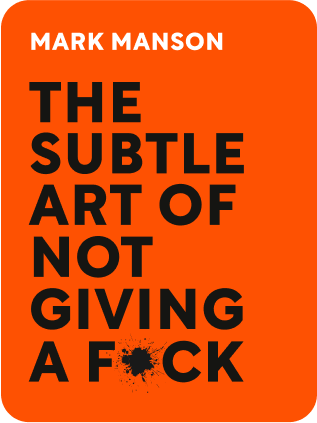

This article is an excerpt from the Shortform book guide to "The Subtle Art of Not Giving a F*ck" by Mark Manson. Shortform has the world's best summaries and analyses of books you should be reading.
Like this article? Sign up for a free trial here .
Are you on a journey of self-discovery? Do you want to find yourself and your identity?
According to The Subtle Art of Not Giving a F*ck, the idea of “finding oneself” may actually be counterintuitive. Author Mark Manson says that labeling yourself puts you in a box and limits your opportunities and growth. Instead, Manson says, you should let go of your identity altogether.
Keep reading to learn why Mark Manson says you should stop labeling your identity.
Let Go of Your Identity
In The Subtle Art of Not Giving a F*ck, author Mark Manson says that you can’t change or improve your life until you’re able to change how you think of or view yourself. However, people typically avoid changes that challenge their identity. They even fear changes that could improve their lives because change pushes them out of their comfort zone.
He adds that success and failure both challenge your identity, which is why people fear them both. We may reject even beneficial opportunities if they require us to change the values by which we define ourselves.
Buddhism teaches that you should give up your idea of who you are because your image of yourself is an artificial creation. The way you think about yourself constrains you, and you should give up these limits. Giving up your concept of who you are frees you to try things, fail, and grow. Conversely, when someone finds oneself, they choose a narrow, rigid identity, they constantly feel threatened by things that challenge it.
(Shortform note: In a similar vein, Joshua Fields Millburn and Ryan Nicodemus explore, in their book Minimalism, how your identity can be an anchor, because it chains you down to who you think you are. For example, if you see yourself as a free-spirited artist, you might pass up an opportunity for a steady office job because that job doesn’t fit with your self-imposed identity. However, that office job might actually lead you to happiness because some part of you also likes to analyze things and work with numbers. If you narrowly define your identity, you might neglect other aspects of your personality.)
We put a lot of effort into “finding” or “knowing” ourselves, but Manson warns that this can be limiting, if the identity you choose is a narrow one. It can restrict your emotional development and opportunities. It’s better to keep learning and discovering than to “find” yourself; you’ll be more open to improvement, and less judgmental about yourself and about the situations you encounter.
In sum, to let go of your identity so that you can adopt better values and priorities, Manson advises that you:
- Accept that you’re not unique or special. Choose a common, non-limiting identity such as friend, student, partner, or parent, instead of a narrower one like a victim or a rising star.
- Give up inflated ideas of yourself that give you a short-lived high, such as that you’re uniquely talented, smart, or attractive (and are therefore entitled). Letting go of these ideas will make you more resistant to failure and allow you to pursue growth, since failure no longer threatens your identity.
| How to Let Go of Your Identity Again, Manson provides general guidelines for how to live, but offers little in the way of concrete steps you can take. Ryan Holiday’s book Ego Is the Enemy suggests three practices to help break out of your self-imposed identity: Stop talking about yourself. In addition to being a waste of time and energy, talking about yourself (self-promotion, as Holiday calls it) is all about asserting your identity—that is, your chosen identity. We can particularly see this happen on social media, where every post you write or share promotes a particular image of yourself. This is true whether you’re consciously crafting that image or not. Stop thinking about yourself. Here, Holiday is specifically talking about self-aggrandizing, egotistical thoughts. Such thoughts put your focus on yourself instead of on what you should be doing; they may also cause you to hesitate when making decisions, out of fear that you’ll choose something that doesn’t live up to your inflated self-image.For example, suppose that your chosen identity is “genius scientist.” You might hesitate to take a lesser position at a lab (like an assistant), even if it would be a good opportunity to further your career, because it doesn’t match up with the picture in your head of you leading projects that change the world. Stop being prideful. Holiday claims that pride is a kind of fraud—it’s your ego lying to you, telling you that you’re better than you are, or that your situation is better than it is. Pride can also be very dangerous: If you’re too caught up in your egotistical fantasies, you’ll overestimate your abilities and overlook dangers. It’s likely that your chosen identity is a major source of pride for you, especially if it’s an “exceptional” identity (whether exceptionally positive or exceptionally negative). That’s another reason why such identities can be difficult to change; letting go of your self-image means letting go of your pride in that image. One example of pride and self-image getting the better of someone is Jocelyn Wildenstein, a NYC socialite who won billions in a divorce settlement. However, less than 20 years later, she declared bankruptcy. It’s unclear whether Wildenstein’s situation was purely the result of outrageous spending habits, or if she received significantly less money than she was promised. However, in either case, it’s clear that her pride told her that she was living the high life with near-inexhaustible wealth, when in reality that was not the case. |

———End of Preview———
Like what you just read? Read the rest of the world's best book summary and analysis of Mark Manson's "The Subtle Art of Not Giving a F*ck" at Shortform .
Here's what you'll find in our full The Subtle Art of Not Giving a F*ck summary :
- How to clarify what's important to you (and not just what you think should be important)
- Why it's okay for things to not always go well in life
- Why you need to care about fewer things






